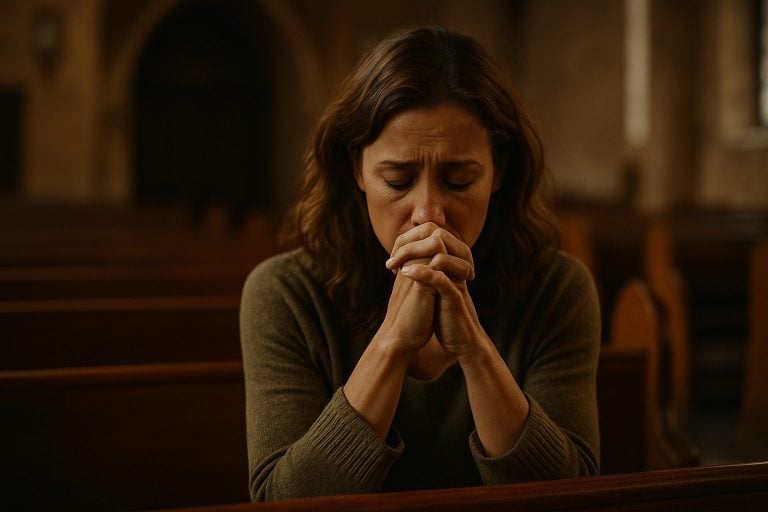How Jesus Managed Stress: Practical Steps For Peace
Estimated reading time: 8 minutes
Life presses in on our minds, our schedules, and our bodies. We want peace, yet worries tug at us from every direction. To start in the right place, we can look at how Jesus lived under pressure. This introduction previews how Jesus managed stress in daily life and invites you to test His way with practical steps.
According to the Gospels, Jesus met heavy demands, constant interruptions, and rising opposition. Nevertheless, He responded with prayer, rest, trust, community, and purpose. Because He walked as a real man, He understands stress and shows us a path that works. For a theological overview of stress as a modern epidemic, see this concise article from Crossway (Jesus’s solution to stress), and remember His promise of peace in John 14:27 (BibleGateway NIV).
Prayer And Solitude
Jesus often stepped away from the noise to pray. Mark reports that He rose very early and found a solitary place to meet the Father (cf. Mark 1:35 NIV). Likewise, Luke notes that He frequently withdrew to lonely places and prayed (see Luke 5:16 NIV). Because quiet communion settled His heart, He returned ready to serve with clarity. However, solitude was not escape. Jesus faced fear openly in Gethsemane and poured out honest words. He asked for relief, then surrendered His will. As a result, prayer became both refuge and runway, which calmed His body and prepared decisive action.
For a vivid picture of pressure on the nervous system, Luke records that Jesus’ sweat became like drops of blood (Luke 22:44 NIV). Physicians identify a rare stress response called hematidrosis that may match this description (medical overview). Nevertheless, Jesus stayed present with the Father. Consequently, He rose from prayer with courage rather than avoidance.
Moreover, you can follow this rhythm. Schedule a short daily retreat, breathe slowly, and speak to God about specific concerns. Then release outcomes. For deeper focus on prayer during anxious moments, see our prayer for anxiety guide. When you repeat this practice, you will notice steadier focus, lighter shoulders, and renewed courage. That is how jesus managed stress in the quiet place.
Rest And Boundaries
Jesus honored limits. After intense ministry, He invited the disciples, “Come with me by yourselves to a quiet place and get some rest” (Mark 6:31 NIV). He even slept in a boat during a storm, which showed practical trust. Therefore, He modeled a humane pace rather than frantic striving. Additionally, He protected time. He changed locations to thin the crowds and avoided demands that undermined His mission.
We also see Him kindly redirecting Martha when busyness eclipsed presence. “You are worried and upset about many things,” He said, “but only one thing is necessary” (Luke 10:38–42 NIV). Because He rested, He remained compassionate instead of irritable. You can imitate that pattern. Block real downtime, guard sleep, and choose the better portion over endless tasks. Even two brief pauses can reset attention and lower tension.
To make rest easier, use simple skills that lower cortisol and quiet the mind. Practical breath work helps: see deep breathing exercises and faith-focused meditation for anxiety. Research summaries also note that spiritual practices and supportive relationships help reduce measurable stress hormones (Healthline overview). When you plan rest first, work fits better. In practice, this boundary keeping is how jesus managed stress expressed in your calendar.

Trust In The Father
Worry shrinks our world. Jesus answered anxiety by pointing to the Father’s care for birds and lilies and by asking, “Who of you by worrying can add a single hour to your life?” He then called us to seek God’s kingdom first (Matthew 6:25–34 NIV). Consequently, trust replaces spiraling thoughts and frees us to act wisely.
In His darkest hour, He still prayed; yet He entrusted His spirit to the Father (Luke 23:46 NIV). Therefore, trust did not ignore pain; it reframed it. For a neuroscience-informed Christian view on surrender reducing mental overactivity, see this summary by the American Association of Christian Counselors (AACC blog). As you practice prayerful surrender, you train your mind to release control.
Today you can practice this with a simple template. Name the fear, pray for help, and hand the result to God. Write one sentence of surrender and read it aloud. Repeat when stress spikes. Over days, you will feel more room in your chest and more clarity in decisions. In effect, this is how jesus managed stress applied to daily thought patterns. For quick biblical anchors, keep our list of Bible verses for anxiety nearby.
Community Support
Jesus did not carry pressure alone. He chose friends, formed a team, and asked Peter, James, and John to watch and pray with Him. He also sent disciples out two by two (Mark 6:7 NIV). Because love reduces reactivity, supportive presence softened stress. Furthermore, He shared meals in trusted homes and welcomed help even from imperfect friends.
Modern summaries show that supportive relationships help reduce cortisol and improve outcomes during difficult events (evidence overview). Therefore, recruit support before a crisis. Tell two friends what you face and how they can help. Ask for specific prayer; accept practical aid; and offer help in return. As relationships strengthen, resilience rises.
When anxiety peaks, grounding skills plus friendship work well together. Explore our guides on grounding techniques and an actionable approach to stop overthinking. Practically, this pattern shows how jesus managed stress lived out in community.

Purpose And Compassion
Purpose steadies the soul. After grieving John the Baptist, Jesus still served with compassion; He healed the sick and fed the hungry (Matthew 14:13–14 NIV). However, He also withdrew to pray again. He held calling and care together without burning out. When stress tightens the chest, serving one person in a focused way widens perspective.
Additionally, seeing our suffering as a fellowship with Christ can strengthen well‑being. Practical research in Christian populations suggests that reframing trials as a way to identify with Christ’s suffering correlates with greater resilience (study summary). Therefore, let purpose guide what you say “yes” to, and let limits guard the rest.
In daily life, write a short mission statement that names whom you serve and why. Review it weekly. Then cut one task that does not fit. Through that lens, you will see how jesus managed stress as a sustainable, compassionate way of working. For structured reflection, practice faith-centered meditation for anxiety between intense commitments.
Applying How Jesus Managed Stress Today
Because wisdom becomes real through practice, translate these patterns into small steps. First, pray for ten minutes each morning. Next, schedule one protected rest block. Then, plan two short walks without your phone. Finally, ask one friend to check in midweek. Moreover, anchor your mind with Scripture. Read John 14:27 for peace and Philippians 4:6–7 for a plan when anxiety rises (NIV). Additionally, revisit Matthew 6 to replace worry with seeking the kingdom.
Consider “Jane,” a composite case from pastoral counseling: she began with baseline anxiety about finances at 8/10, frequent 3 a.m. awakenings, and headaches. She practiced morning prayer, guarded a weekly Sabbath, and invited two friends to pray. She also learned slow nasal breathing and brief grounding drills. After three months, her self‑rated financial anxiety fell to 4/10, and she slept through most nights. Consequently, her family noticed more patience and warmth. This simple plan reflects how jesus managed stress in modern life.
To round out your toolkit, learn body skills that reduce arousal. Practice slow breathing, relax your shoulders, and stretch your hands. For how‑to steps, review our practical guide to deep breathing exercises. Then combine skills with trust, community, and purpose. Over time, your baseline calms. In summary, this is how jesus dealt with anxiety translated into repeatable habits.
Recommended Tools
Practical tools help habits stick. Choose resources that support prayer, rest, and quiet focus. Because tools cannot replace faith, treat them as supports rather than solutions. You still pray, rest, trust, and build community. Nevertheless, wise gear can remove friction and keep your plan simple enough to repeat daily.
- NIV Study Bible (for deep, focused meditation)
- Prayer Journal (capture prayers and answered requests)
- The Ruthless Elimination of Hurry (reset your pace)
- Breath: The New Science of a Lost Art (better breathing)
- Sony WH‑1000XM4 Noise‑Canceling Headphones (build quiet)
Conclusion: Walk With The Prince Of Peace
Jesus faced real pressure and offered real peace. He prayed honestly, rested wisely, trusted fully, leaned on friends, and loved with purpose. When you imitate His pattern, anxiety loosens and courage grows. Therefore, take one step today. Pick a time to pray, block a rest window, invite a friend into your process, or serve one person with compassion. As you practice these small actions, the Spirit strengthens you.
Step by step, you will experience how jesus managed stress as a hopeful, steady way of life. For a pastoral overview of both spiritual and physiological dimensions of stress, see this short Crossway summary (stress and spirituality) and a neuroscience‑informed perspective on surrender from AACC (stress resilience).






